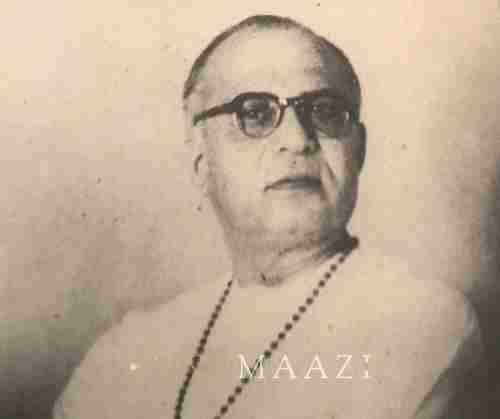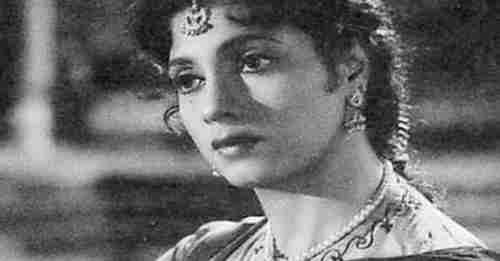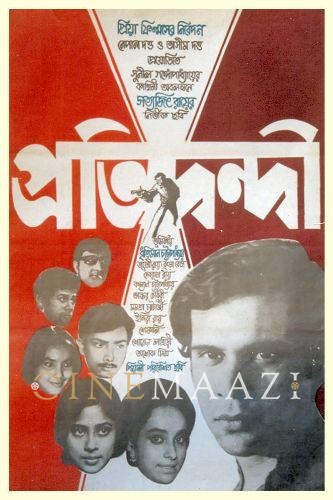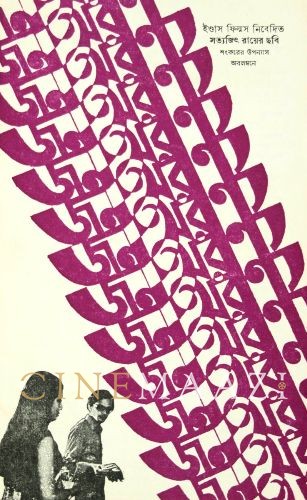This section is for paid subscribers only. Our subscription is only $3700/- for one full year.
You get unlimited access to all paid section and features on the website with this subscription.
Subscribe to read full article
This section is for paid subscribers only. Our subscription is only $37/- for one full year.
You get unlimited access to all paid section and features on the website with this subscription.
Not ready for a full subscription?
You can access this article for $2, and have it saved to your account for one year.
- FormatB-W
- LanguageBengali
- Run Time105 min
- Length3005.93 meters
- Number of Reels11
- Gauge35mm
- Censor RatingU
- Shooting LocationIndrapuri Studio
A young man in Calcutta, Siddhartha Chaudhuri, is forced out of medical college and pushed to seek a job when his father passes away. Siddhartha lives with his mother, his uncle, his sister Sutapa (‘Tapu’), and his brother Tunu. Sutapa is the sole breadwinner in the family, while Tunu is actively involved in student politics.
Armed with his botany degree, Siddhartha goes for an interview, where his answers reveal him to be young and idealistic, prompting the interviewer to ask him if he is a Communist. He later meets Naresh da, an old acquaintance associated with Leftist politics as well. He suggests first that Siddhartha join a factory as a menial worker. When Siddhartha seems disinclined, he tells him of a job as a medical representative with Dr. Suren Das, the owner of National Pharmaceuticals.
Wandering the streets, Siddhartha walks into a movie theatre and is lulled to sleep. However, a bomb explodes inside the hall and he is rudely ejected. He meanders to the banks of the Ganga, and sees a group of hippies admiring the city and its many charming qualities. Unable to find the peace they emanate within himself, he visits his friends Adinath and Shiben. He is sorely disappointed to find the relentlessly pragmatic Adinath stealing funds from Red Cross collections. Shiben takes him to watch an uncensored Swedish film, and uninterested in the explicit sexuality onscreen, Siddhartha falls asleep again. While walking with Shiben, he expresses his resentment towards Tapu, implying that she has acquired her job not because of her academic qualifications, but her charming physical attributes. Afraid to act on his own sexual desires, Siddhartha seems both drawn to and intimidated by the newly confident women he sees on the streets, and he counts his sister among their number.
When he goes back home, he walks into his mother being accosted by Mrs. Sanyal, the wife of Tapu’s boss, who accuses Tapu of breaking up her home. Tapu seems unfazed by these accusations and the scandal they bring to the house, further disturbing Siddhartha. He cannot communicate with his brother Tunu either, who is caught up in the fervour of student politics. Tunu expresses his disappointment with his older brother’s pursuit of gainful employment. Feeling increasingly alienated from his siblings, Siddhartha keeps withdrawing into his memories of their idyllic childhood spent in the village chasing after the cries of birds.
Incensed by the rumours surrounding Tapu and her job, Siddhartha lands up at her boss’ house. Mr. Sanyal’s affluence is immediately apparent to him. Though he fantasizes about killing the man, he is unable to convey what he means, and ineffectually tells him that Tapu is under too much strain to continue with her job. When Mr. Sanyal offers to write him a recommendation letter, he leaves. As he walks away, he notices a mob attacking the driver of a Mercedes for having run over a young girl. He attempts to join the mob in an effort to let out his rage, but he is unable to do so. Later, he meets Dr. Suren Das, who offers him a job as a salesman in Balurghat, some way outside the city. Siddhartha is torn by this, unwilling to leave the city behind. When he discusses this with Adinath, he is told that he is a “thinker”, incapable of acting on his fantasies. Adi takes him out for dinner and drinks, and later to his friend’s house, a woman who is a part-time sex worker. Disgusted both by her openness and Adi’s participation in her exploitation, Siddhartha rushes out. While walking home, he is hailed by a young woman named Keya Mukherjee to repair the fuse at her house. He finds some comfort in her uncomplicated company. When he comes home, Tapu tells him that she is considering modelling as a career. He is horrified when he imagines her doing so. Tunu, meanwhile, is packing to go to the villages as part of his political organization. That night, Siddhartha has a dream which explores his anxieties: he sees Tapu modelling in a swimsuit and Tunu being executed by a firing squad. He then sees Tapu dressed as the nurse/sex worker, and her face morphs into Keya’s.
With a new sense of Keya’s importance in his life, he grows closer to her. Keya, however, plans to return to Delhi to continue her education since her father is planning to marry her maternal aunt, an idea she cannot bear. Confronted with the possibility of their separation, the two young lovers promise to write to each other.
The next morning, Siddhartha goes to another interview. Kept waiting for hours, another young applicant faints in the intolerable heat. The apathy of the management angers him, and he gets into a furious altercation with the interviewers. As the narrative draws to an end, Siddhartha is shown travelling to Balurghat as a salesman. Settling into his new surroundings, he hears the call of the bird he had been in search of. Finally at peace, he writes to Keya and signs off with “Iti Siddhartha” (Regards, Siddhartha).
Pratidwandi was the first of the trilogy now famous as Satyajit Ray’s ‘Calcutta Trilogy’, also including Seemabaddha (1971) and Jana Aranya (1976). It was adapted from Sunil Gangopadhyay’s eponymous novel, and is known for its focus on the changing landscape of the city.
Cast
-
Dhritiman Chatterji
Siddhartha Chaudhuri -
Krishna Bose
Sutapa -
Kalyan Chatterjee
Shiben -
Debraj Roy
Tunu -
Indira Devi
Sarojini -
Mamata Chatterjee
Sanyal's wife -
Shefali
Lotika -
Soven Lahiri
Sanyal -
Dhara Roy
Keya's aunt -
Pisu Majumdar
Keya's father
Crew
-
BannerPriya Films
-
Director
-
Producer
-
Music Director
-
Story Writer
-
Screenplay
-
Cinematography
-
Editing
-
Sound Recording/ Audiography
-
Art Director/Production Design
-
Production Controller
-
Make-up
-
Re-recordist/ Sound Mixing
-
Laboratory/ Processed atUnited Cine Laboratories
-
StillsNemai Ghosh , Technica










.jpg)



